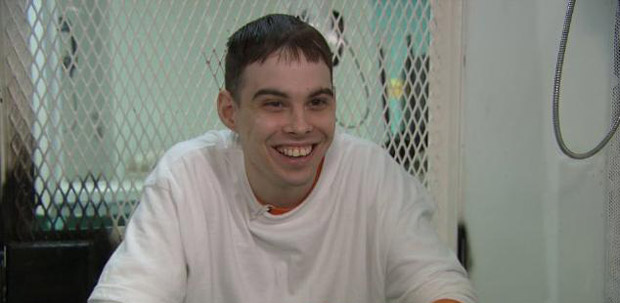Showing @ Cameo Cinema, Edinburgh until Thu 5 Apr
Werner Herzog / USA/UK/Germany / 2011 / 107 mins
Werner Herzog’s career as a documentarian has been defined by his ability to extract the most laborious moral concepts. He remains one of the most profound directors today, and with this latest exploration, produces a similarly high-quality product which sadly can’t live up to previous attempts.
Here, he documents the case of Michael Perry and Jason Burkett who were both convicted of triple-homicide in 2001, the former receiving the death penalty and the latter a life sentence. Herzog interviews the two men, talking to Perry only eight days before his execution, along with family members of the victims and others involved in Conroe, Texas to explore the reaction and consequences of the tragedy.
The film’s title seems apt; Herzog is exploring how death is recondite, how capital punishment is capricious and how the higher ideals we hold, of justice and peace, are almost impossible to articulate. The conversations he has with both the victims’ family members and the perpetrators focus on the art of expression, as he asks them to explain specifically how they cope with their surroundings and have adapted to a life which has changed so dramatically. This attention to detail again feels typically Herzogian, much like in Little Dieter Needs to Fly, featuring that familiar gazing camera which seems to linger on its characters with inquisitive purpose and profundity. The film’s tone is assisted by calm, restful music which almost jars against the harsh, even bitter, subject matter Herzog is dealing with – an aesthetic tactic reminiscent particularly of Grizzly Man but also Encounters at the End of the World.
Yet his presence feels uneasy and indulgent in this film; he flirts with this in The White Diamond but always keeps it at arm’s length. Here however, he involves himself much more directly and steps away from his usual narrating role, often speaking over the people he is interviewing. Clearly, he is trying to push them, to force them into explaining the most difficult emotional insights, but it doesn’t provide enough outside reflection which he achieves as a liminal force in works such as Wheel of Time. Herzog’s obsession with the human condition and the fundamental ethical beliefs which drive our behaviour appeals to the tragic figures in his films who are seemingly at odds with an arcane world and must battle against a raw deal. His interest in this, particularly as he stands firmly against capital punishment, is obviously the catalyst for the four part mini-series On Death Row which aired in the US last month.
As a filmmaker, his fascination with people is always dangerous, as sentimentality is inevitable. Yet he manages to step away from it in most of his documentaries by providing a philosophical insight into conduct, reflecting on some metaphorical notion of being which governs life and pervades our social and ethical engagement. He doesn’t quite achieve it here; instead he brings forward and obscures the advantages of capital punishment but largely uses it to express his own opinion on the matter. In that sense, he uses his film to fulfill his own needs but ultimately seems less concerned with his audience.


One thought on “Into the Abyss”